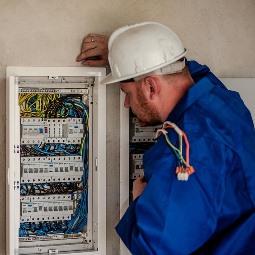How to Pick the Best Technical School Training near Buffalo North Dakota
 Choosing to work in a new profession and enroll in a vocational school near Buffalo ND are serious decisions that will greatly influence your future career. But with so many vocational schools to choose from, exactly how do you approach locating the ideal one? Not only do you have to make sure that you will get the comprehensive training necessary to succeed in your new profession, but also that the school is reputable and well regarded. A number of prospective students make the error of selecting a vocational school simply because the campus is closest to their residence or where the work. Or they may gravitate to the one that charges the lowest tuition. Of course the cost and location of the training are critical factors when evaluating trade school options, but they must not be the only ones. Additional variables such as accreditation and the reputation of the schools are important as well. So before you begin evaluating and comparing trade schools, you must know what questions you should be asking in order to get the information to make a final selection. We will cover several of those questions later in this post. But first, let’s talk about a few of the trade options that are available as well as the availability of online programs.
Choosing to work in a new profession and enroll in a vocational school near Buffalo ND are serious decisions that will greatly influence your future career. But with so many vocational schools to choose from, exactly how do you approach locating the ideal one? Not only do you have to make sure that you will get the comprehensive training necessary to succeed in your new profession, but also that the school is reputable and well regarded. A number of prospective students make the error of selecting a vocational school simply because the campus is closest to their residence or where the work. Or they may gravitate to the one that charges the lowest tuition. Of course the cost and location of the training are critical factors when evaluating trade school options, but they must not be the only ones. Additional variables such as accreditation and the reputation of the schools are important as well. So before you begin evaluating and comparing trade schools, you must know what questions you should be asking in order to get the information to make a final selection. We will cover several of those questions later in this post. But first, let’s talk about a few of the trade options that are available as well as the availability of online programs.
Vocational School Training Options near Buffalo ND
 There are an abundance of professions to select from in vocational schools that offer gratifying and good paying careers. Maybe you have already decided on one that you have for years desired to pursue. For instance, perhaps you have always taken pleasure in working on your car and have thought about using that ability to earn a living as an automotive tech. Or maybe a member of the family has had a long and successful career in a particular vocation or trade and you would love to follow in his or her footsteps. Regardless of what your inspiration is for going into a trade, there is likely a program offered that will provide the training you require. Below is merely a small representation of the vocational training programs that are offered in the Buffalo ND area.
There are an abundance of professions to select from in vocational schools that offer gratifying and good paying careers. Maybe you have already decided on one that you have for years desired to pursue. For instance, perhaps you have always taken pleasure in working on your car and have thought about using that ability to earn a living as an automotive tech. Or maybe a member of the family has had a long and successful career in a particular vocation or trade and you would love to follow in his or her footsteps. Regardless of what your inspiration is for going into a trade, there is likely a program offered that will provide the training you require. Below is merely a small representation of the vocational training programs that are offered in the Buffalo ND area.
- Automotive Technician
- Heating And Air Conditioning (HVAC) Tech
- Plumbing
- Electrical Technician
- Welder
- Truck Driving
- Aircraft Maintenance Tech
- Lab Technician
- Construction Management
All programs will have differing completion times and costs based upon the vocation, type of credential and school. Some of the programs may be completed in a few weeks, while others will call for months or even two or more years of schooling. Each of these variables need to be taken into account before choosing a vocation and school.
Click Here to Get Free Information on Trade Schools Near You!
Learning a Trade Online
 Online schools have become more attractive with Buffalo ND students and a growing number of accredited programs are becoming available. Even though learning online is a very convenient and accessible way to acquire a degree or certificate, it may not be the ideal option for all trades or vocations. For instance, learning to drive a tractor trailer is not something that you can accomplish online, nor is learning how to weld. These are skills that need to be mastered through hands on training and by doing it, not by reading about it or watching videos. But certain components of the training can be suitable for online training, for example learning safety and driving guidelines for trucking schools or studying metallurgy or how to read blueprints for welder schools. A number of programs will blend online instruction with on campus practical training, for example for electrician or welding schools. So it is crucial to determine before choosing an online program for any vocation if there is a suitable amount of practical training allocated to the syllabus. One way to help establish est that a vocational school program is both suitable for online education and delivers in-depth hands-on training is to verify that it’s accredited by a nationally recognized accrediting organization (more on accreditation later). For those vocations that are appropriate for training online, it can be a practical way for those with time constraints to learn a new trade.
Online schools have become more attractive with Buffalo ND students and a growing number of accredited programs are becoming available. Even though learning online is a very convenient and accessible way to acquire a degree or certificate, it may not be the ideal option for all trades or vocations. For instance, learning to drive a tractor trailer is not something that you can accomplish online, nor is learning how to weld. These are skills that need to be mastered through hands on training and by doing it, not by reading about it or watching videos. But certain components of the training can be suitable for online training, for example learning safety and driving guidelines for trucking schools or studying metallurgy or how to read blueprints for welder schools. A number of programs will blend online instruction with on campus practical training, for example for electrician or welding schools. So it is crucial to determine before choosing an online program for any vocation if there is a suitable amount of practical training allocated to the syllabus. One way to help establish est that a vocational school program is both suitable for online education and delivers in-depth hands-on training is to verify that it’s accredited by a nationally recognized accrediting organization (more on accreditation later). For those vocations that are appropriate for training online, it can be a practical way for those with time constraints to learn a new trade.
Questions to Ask Vocational School Programs
 After you have selected the vocation and type of degree or certificate that you wish to obtain, either on campus or online, you can start to limit your selection of schools. As you are certainly aware, there are many vocational schools in the Buffalo ND area and all over the USA to choose from. That’s why it is essential to have a checklist of key qualifications when making school evaluations. As formerly stated in our opening paragraph, tuition and location will probably be the initial two aspects you will look at. Following are some additional ones that you will want to research before enrolling in your school of choice.
After you have selected the vocation and type of degree or certificate that you wish to obtain, either on campus or online, you can start to limit your selection of schools. As you are certainly aware, there are many vocational schools in the Buffalo ND area and all over the USA to choose from. That’s why it is essential to have a checklist of key qualifications when making school evaluations. As formerly stated in our opening paragraph, tuition and location will probably be the initial two aspects you will look at. Following are some additional ones that you will want to research before enrolling in your school of choice.
Accredited. A large number of Buffalo ND area technical schools have received either a regional or a national accreditation. They may earn Institutional Accreditation, which focuses on the school’s programs overall, or Programmatic Accreditation, which relates to a specific program, such as HVAC technology. Confirm that the school and program are accredited by a U.S. Department of Education acknowledged accrediting organization, which includes the Accreditation Board for Engineering and Technology. In addition to helping ensure that you receive a quality education, it can help in obtaining financial assistance or student loans, which are often not available for non-accredited schools. Furthermore, a number of states mandate that the training course be accredited in order to be approved for licensing where applicable.
How Long in Business? One clue to help assess the quality of a vocational school near Buffalo ND is how long it has been in business. A poorly rated or a fly by night school normally will not stay in business very long, so longevity is a big plus. Having said that, even the best of schools had to start from their first day of training, so consider it as one of several qualifications.
Completion Rates. Ask the trade schools you are looking at what their completion rates are. The completion rate is the portion or percentage of students who enroll in and complete the program. A lower completion rate might indicate that students were dissatisfied with the program and quit. It might also signify that the instructors were not competent to train the students. It’s similarly important that the schools have high job placement rates. Older and/or more reputable schools may have a more extensive list of alumni, which can produce more contacts for the school to use for their apprenticeship and job placement programs. A high job placement rate will not only validate that the school has an excellent reputation within the industry, but also that it has the network of contacts to help grads obtain apprenticeships or jobs in the Buffalo ND area.
Apprenticeship Programs. Most vocational programs are taught together with an internship or an apprenticeship program. Those participating trade and vocational schools will help place you in an apprenticeship program within their network of companies or labor unions. Find out if the schools you are considering have referring relationships with Buffalo ND area professionals in the trade. An apprenticeship not only provides a rewarding experience by providing practical training, but it also provides employment opportunities and helps to establish relationships in the area professional community.
Modern Facilities. Make sure that the school facilities and the equipment that you will be trained on are up-to-date and what you will be using in the field. If you are currently in an internship or an apprenticeship, check with the technician you are working with concerning what you should be expecting. If not, ask a local Buffalo ND contractor if they can provide some tips. Also bear in mind that unless you can move, the school needs to be within driving distance of your residence. Remember that if you decide to enroll in an out-of-state school, in addition to moving costs there might be increased tuition charges compared to in-state residents.
Smaller Classes. It’s important that you receive as much one-on-one instruction as possible, which can be challenging in bigger classes. Ask if you can sit in on a couple of the classes so that you can see how big they are and experience the interaction between teachers and students. Speak with a few of the students and get their opinions relating to class sizes and instruction. Finally, talk to a few of the instructors and find out what their level of experience is in North Dakota and what degrees or certifications they have earned.
Flexible Scheduling. Verify that the class schedules for the programs you are reviewing are flexible enough to fulfill your needs. If you are only able to go to classes in the evening or on weekends near Buffalo ND, verify that the schools you are comparing provide those choices. If you can only attend part-time, be sure that the school you select offers part-time enrollment. Additionally, ask what the protocol is to make-up classes should you miss any because of work, illness or family issues.
Vocational Classes Buffalo North Dakota
 Finding the ideal trade school near Buffalo ND is an important beginning toward a gratifying career in the vocation of your choice. As we have discussed in this article, you should choose a technical school and a certificate or degree program that are both accredited and have exceptional reputations within the professional community. Other factors to look for are ample practical training and modern facilities. You should go to each of the schools personally that you are most interested in to explore the campus and speak with both the current students and faculty. Attempt to get a feel for the quality of the instruction and the interaction between them. Also, ask about scheduling choices and whether or not night or weekend classes are offered if needed. And don’t forget to ask about financial aid and student loan options too. You initially came to this website because of your interest in Vocational Classes and wanting more information on the topic Going To Trade School After College. However, if you ask the proper questions as we have detailed in our checklist for evaluating schools, you’ll be able to narrow down your options so that you can make an informed decision. With the proper training, hard work and commitment, you can eventually become a licensed professional in your chosen trade.
Finding the ideal trade school near Buffalo ND is an important beginning toward a gratifying career in the vocation of your choice. As we have discussed in this article, you should choose a technical school and a certificate or degree program that are both accredited and have exceptional reputations within the professional community. Other factors to look for are ample practical training and modern facilities. You should go to each of the schools personally that you are most interested in to explore the campus and speak with both the current students and faculty. Attempt to get a feel for the quality of the instruction and the interaction between them. Also, ask about scheduling choices and whether or not night or weekend classes are offered if needed. And don’t forget to ask about financial aid and student loan options too. You initially came to this website because of your interest in Vocational Classes and wanting more information on the topic Going To Trade School After College. However, if you ask the proper questions as we have detailed in our checklist for evaluating schools, you’ll be able to narrow down your options so that you can make an informed decision. With the proper training, hard work and commitment, you can eventually become a licensed professional in your chosen trade.
Other North Dakota Hard Working Locations
Buffalo, North Dakota
As of the census[2] of 2010, there were 188 people, 92 households, and 52 families residing in the city. The population density was 817.4 inhabitants per square mile (315.6/km2). There were 101 housing units at an average density of 439.1 per square mile (169.5/km2). The racial makeup of the city was 92.6% White, 0.5% African American, 1.6% Native American, 0.5% Asian, and 4.8% from two or more races.
There were 92 households of which 19.6% had children under the age of 18 living with them, 50.0% were married couples living together, 3.3% had a female householder with no husband present, 3.3% had a male householder with no wife present, and 43.5% were non-families. 39.1% of all households were made up of individuals and 19.5% had someone living alone who was 65 years of age or older. The average household size was 2.04 and the average family size was 2.73.
The median age in the city was 44 years. 19.7% of residents were under the age of 18; 6.4% were between the ages of 18 and 24; 24.5% were from 25 to 44; 24% were from 45 to 64; and 25.5% were 65 years of age or older. The gender makeup of the city was 53.2% male and 46.8% female.
